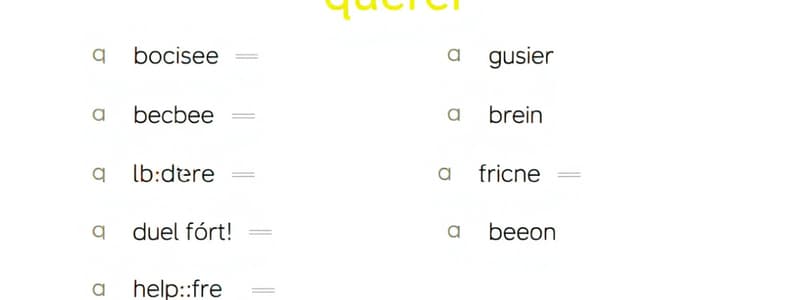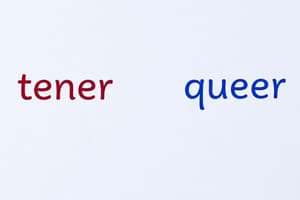Podcast
Questions and Answers
¿Cuál es la forma correcta del verbo 'querer' para yo?
¿Cuál es la forma correcta del verbo 'querer' para yo?
- Quiere
- Quiero (correct)
- Quieres
- Queremos
¿Qué es 'preferir' para él, ella, or Usted?
¿Qué es 'preferir' para él, ella, or Usted?
- Preferimos
- Prefieres
- Prefiere (correct)
- Prefiero
¿Cuál es la forma correcta de 'tener' para tú?
¿Cuál es la forma correcta de 'tener' para tú?
- Tengo
- Tienes (correct)
- Tienen
- Tenemos
¿Cuál de las siguientes frases es correcta utilizando 'querer' para nosotros?
¿Cuál de las siguientes frases es correcta utilizando 'querer' para nosotros?
En presente, ¿cómo se conjuga el verbo 'preferir' en la primera persona del singular?
En presente, ¿cómo se conjuga el verbo 'preferir' en la primera persona del singular?
Flashcards
Querer
Querer
Usar el verbo "querer" para expresar un deseo o una preferencia.
Preferir
Preferir
Usar el verbo "preferir" para indicar una opción entre dos o más posibilidades.
Tener
Tener
Expresar posesión o existencia de algo utilizando "tener".
No querer
No querer
Signup and view all the flashcards
No preferir
No preferir
Signup and view all the flashcards
Study Notes
Questions with the Present Tense of "Querer," "Preferir," and "Tener" Expressions
-
"Querer" (to want): Questions about wants and desires. The verb "querer" typically expresses a wish or desire.
-
Form follows subject pronouns:
-
¿Qué quieres comer? (What do you want to eat?)
-
¿Qué quiere ella? (What does she want?)
-
¿Qué queremos hacer? (What do we want to do?)
-
Questions often use "¿qué," "¿quién," "¿cuál," etc. to ask about the object of the desire.
-
Indirect object pronouns (e.g., me, te, le, nos, os, les) may be used if the object of the desire is also the recipient.
-
¿Quieres algo de beber? (Do you want something to drink?)
-
¿Qué le quieres regalar a tu madre? (What do you want to give your mother?)
-
Formulating the question with an auxiliary verb like "estar" to emphasize the present action or state is less common but possible.
-
¿Qué estáis queriendo pedir? (What are you wanting to/trying to order?)
-
Note these questions often relate close to the concept of "desear" to express desire.
-
"Preferir" (to prefer): Questions focused on expressing preferences. "Preferir" implies a conscious choice between options.
-
Uses the same structure of questions with "¿qué," "¿quién," "¿cuál," etc. to specify the object of preference.
-
Direct objects often precede the verb "preferir,"
-
¿Qué prefieres comer, pasta o pizza? (What do you prefer to eat, pasta or pizza?)
-
¿Prefieres este libro o aquel? (Do you prefer this book or that one?)
-
Similar to other present tense verbs, question form adjusts based on the subject.
-
"¿Qué prefieres?" (What do you prefer?).
-
Often involves indirect comparison between options.
-
Notice the context dictates whether the question asks about a general preference or a preference about something happening now. These expressions can be further nuanced when combining with "más" (more) or "menos" (less).
-
¿Prefieres más el pescado que el pollo? (Do you prefer fish more than chicken?)
-
"Tener" (to have): Questions about possession, state of being and age. This verb has a vast range of uses.
-
General questions about possessions:
-
¿Qué tienes en la mochila? (What do you have in your backpack?)
-
¿Tiene un perro tu hermano? (Does your brother have a dog?)
-
Possessive questions relating to a temporary state or action: (use of auxiliary verbs)
-
¿Qué está teniendo María? (What is María having?)
-
Questions about age:
-
¿Cuántos años tiene tu padre? (How old is your father?)
-
Questions about physical/mental condition:
-
¿Cómo te sientes? (How are you feeling?)
-
Questions concerning a capacity or ability:
-
¿Qué tienes que hacer hoy? (What do you have to do today?)
-
Questions relating to experience or knowledge:
-
¿Tienes idea de dónde está? (Do you have any idea where it is?)
-
Context determines the nuance of meaning. Carefully evaluate context and intended meaning within the sentence when examining these applications.
Further Considerations
- Word Order: In Spanish, question word order typically changes depending on the verb. Pay close attention to the placement of question words.
- Subject Pronouns: Subject pronouns (yo, tú, él, ella, nosotros, nosotras, vosotros, vosotras, ellos, ellas) are frequently omitted if implied by the context.
- Verb Conjugations: Remember that verb conjugation varies with the person (first, second, or third-person singular/plural) and tense.
- Intonation: Context matters. The intonation of the question can help differentiate a simple query from a more emphatic one, and the subtle difference in context or mood.
Studying That Suits You
Use AI to generate personalized quizzes and flashcards to suit your learning preferences.




